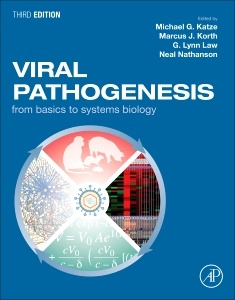Description
Viral Pathogenesis (3rd Ed.)
From Basics to Systems Biology
Coordinators: Katze Michael G., Korth Marcus J., Law G. Lynn, Nathanson Neal
Language: English
Subjects for Viral Pathogenesis:
Support: Print on demand
Description
/li>Contents
/li>Biography
/li>Comment
/li>
Viral Pathogenesis: From Basics to Systems Biology, Third Edition, has been thoroughly updated to cover topical advances in the evolving field of viral pathogenesis, while also providing the requisite classic foundational information for which it is recognized.
The book provides key coverage of the newfound ability to profile molecular events on a system-wide scale, which has led to a deeper understanding of virus-host interactions, host signaling and molecular-interaction networks, and the role of host genetics in determining disease outcome.
In addition, the content has been augmented with short chapters on seminal breakthroughs and profiles of their progenitors, as well as short commentaries on important or controversial issues in the field. Thus, the reader will be given a view of virology research with perspectives on issues such as biomedical ethics, public health policy, and human health. In summary, the third edition will give the student a sense of the exciting new perspectives on viral pathogenesis that have been provided by recent developments in genomics, computation, modeling, and systems biology.
Viral Pathogenesis: From Basics to Systems Biology
1. The Human Toll of Viral Diseases: Past plagues and pending pandemics
Neal Nathanson
2. Historical Roots: The family tree of viral pathogenesis
William C. Summers
3. Basic Concepts: A step-by-step guide to viral infection
Robert Doms
4. Innate Immunity: Recognizing and responding to foreign invaders—no training needed
Christine A. Biron
5. Adaptive Immunity: Neutralizing, eliminating, and remembering for the next time
E. John Wherry, David Masopust
6. Aberrant Immunity: The consequences of overreacting or underperforming
E. John Wherry, David Masopust
7. Patterns of infection: Unwanted guests—quick visits and extended stays
Neal Nathanson and Francisco González-Scarano
8. Viral Oncogenesis: Infections That Can Lead to Cancer
Nicholas A. Wallace and Denise A. Galloway
9. HIV and AIDS: Science wrestles with 10,000 nucleotides—points but no pin
Guido Silvestri and Emily Cartwright
10. Animal Models: No model is perfect, but many are useful
Victoria K. Baxter and Diane E. Griffin
11. Systems Virology: Why Everybody Wants To Measure Everything
Marcus J. Korth and G. Lynn Law
12. The Virus-Host Interactome: Knowing the players to understand the game
Monika Schneider, Jeffery R. Johnson, Nevan J. Krogan, and Sumit K. Chanda
13. Host Genetics: It’s not just the Virus, Stupid
Martin T. Ferris, Mark T. Heise, and Ralph S. Baric
14. Host metabolomics: Yet more ways your health is influenced by fat
Priscilla Yang
15. Mathematical Modeling: Solving equations to measure viral diseases – math rules
Alan S Perelson
16. Emerging viral diseases: Why we need to worry about bats, camels, and airplanes
James W. Le Duc and Neal Nathanson
17. Viral evolution: It’s all about mutations
Adi Stern and Raul Andino
18. Viral Epidemiology: Tracking viruses with smartphones and social media
Kaitlin Rainwater-Lovett, Isabel Rodriguez-Barraquer and William J. Moss
19. Viral Vaccines: Fighting viruses with viruses
Juliet Morrison and Stanley Plotkin
20. Antiviral Therapy
Douglas D. Richman and Neal Nathanson
21. Breakthrough: Nobel prize discoveries in viral pathogenesis
Neal Nathanson
22. What lies ahead? Scientists look into their crystal balls
Dr. Korth is a Senior Research Scientist in the Department of Microbiology at the University of Washington. He specializes in technical and medical writing and the effective communication of scientific concepts in grants, contracts, and the professional literature. He is a member of the American Medical Writers Association and holds a BA in psychology from the University of Wisconsin-Eau Claire, a BS in microbiology and BSMT in medical technology from the University of Montana, and a PhD in microbiology from the University of Washington. His research interests are in the use of systems biology approaches to study viral pathogenesis.
Dr. Law is a Senior Research Scientist in the Department of Microbiology at the University of Washington. Her research interests are in the use of high-throughput and computational approaches to study virus-host interactions. She has managed several large programs that utilize different animal models, high-throughput technologies such as microarray and RNS-seq assays, and computational approaches to define the host response to a variety of viruses including influenza, SARS, MERS, and SIV. The overarching goal of these studies is to identify host targets for therapeutic interventions. She holds a BA in chemistry from the University of
- Covers all aspects of viral infection, including viral entry, replication, and release, as well as innate and adaptive immunity and viral pathogenesis
- Provides a fresh perspective on the approaches used to understand how viruses cause disease
- Features molecular profiling techniques, whole genome sequencing, and innovative computational methods
- Highlights the use of contemporary approaches and the insights they provide to the field




